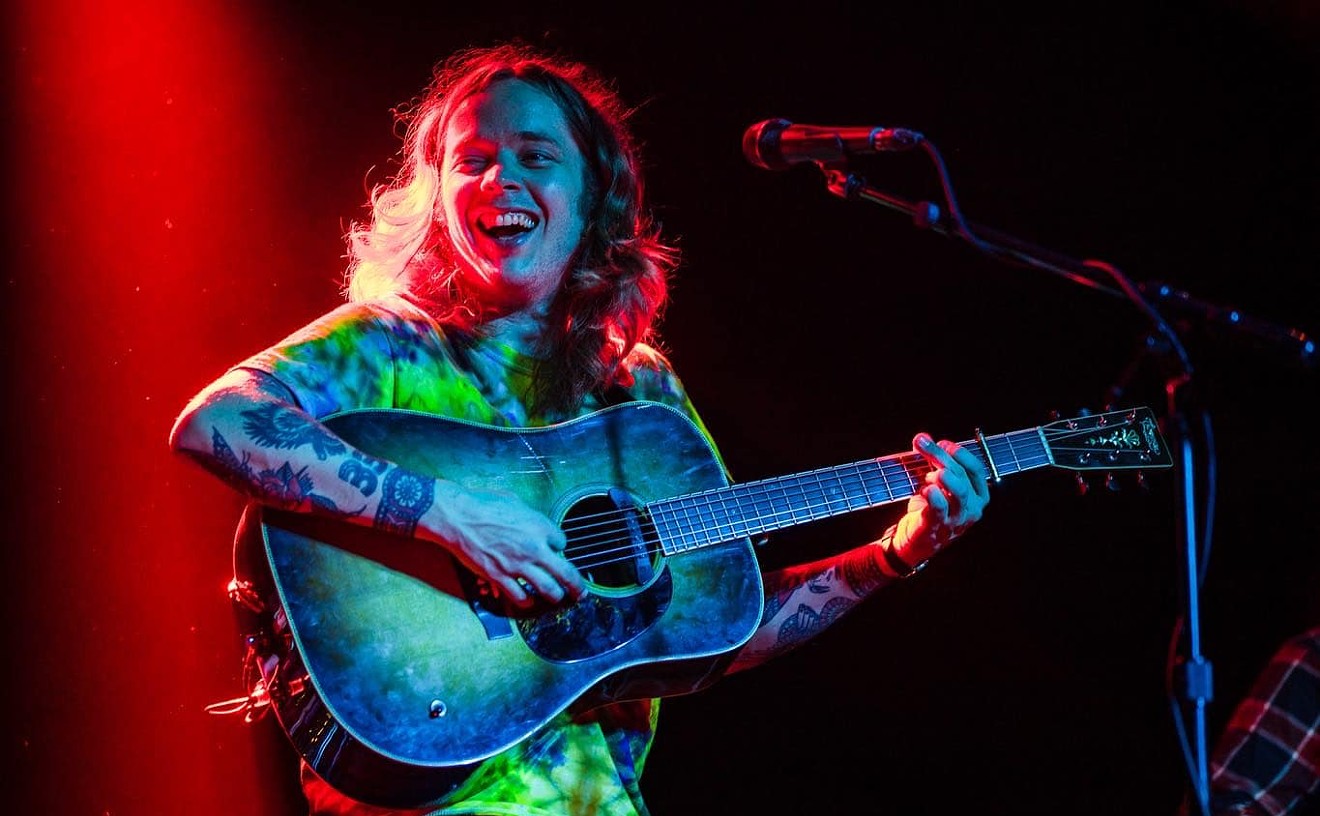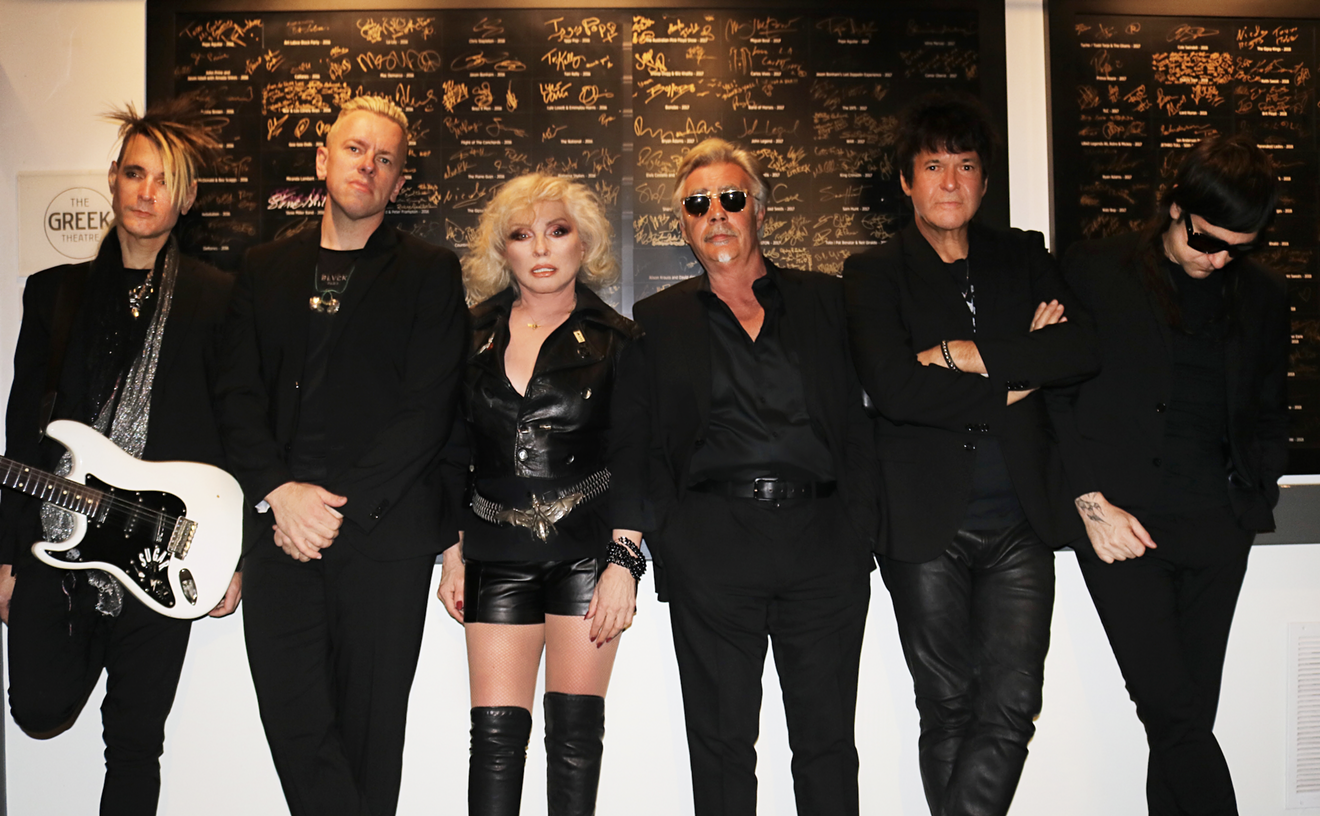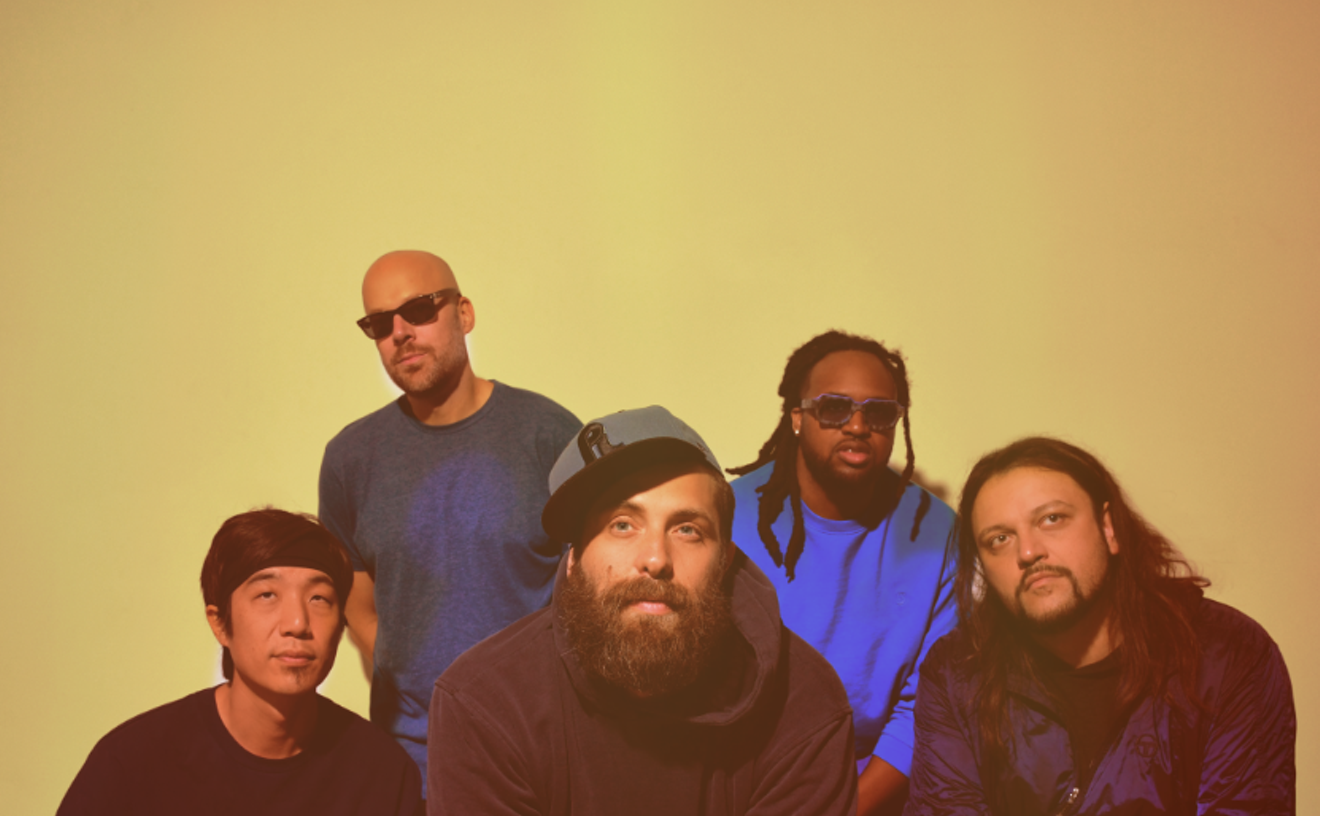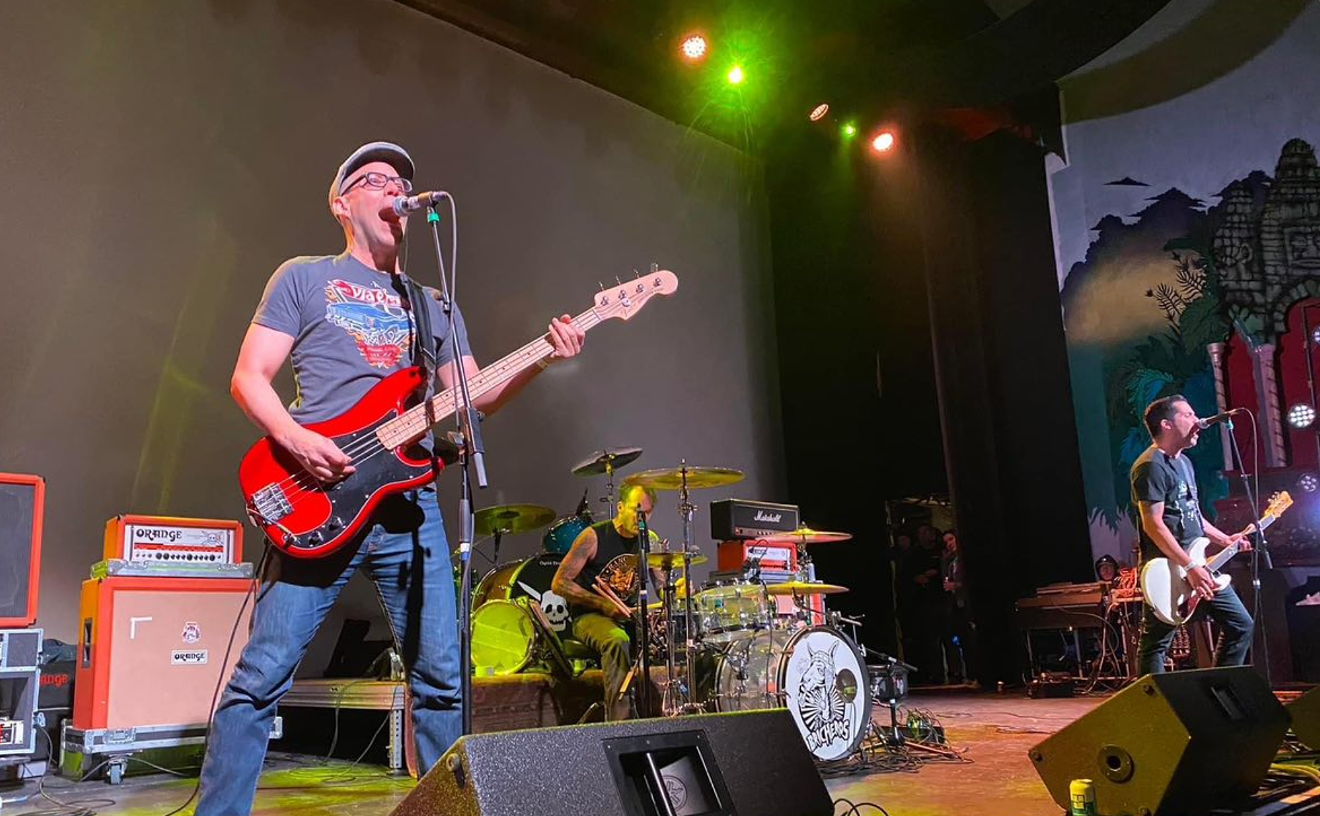Critics tend to view such sentiments with contempt, as if any performer who displays the slightest unwillingness to suffer and die penniless for his art is pissing on the grave of Vincent Van Gogh. But Aceyalone understands, as anyone even tangentially involved in the entertainment industry should, that popular music is inextricably bound with commerce. The trick, figuratively speaking, is to find a way to serve the gods of inspiration and the guardians of mammon simultaneously. "My whole idea with this music besides being creative is to be successful," he says. "So I try to take the best route."
On Aceyalone's new disc, Accepted Eclectic (issued jointly by San Francisco's Nu Gruv Alliance, the independent imprint Ground Control and the musical coalition Project Blowed), the emphasis is placed right where it belongs -- on his voice, a marvelously fluid, criminally underappreciated instrument. But the CD also focuses on accessibility, an element that wasn't as large a part of the mix on A Book of Human Language, a hip-hop album as deep and complex as any put out in 1998. Whereas Language was a virtual concept album in which Aceyalone probed a vast array of cultural, societal and interpersonal conditions, Eclectic is dominated by mildly boastful offerings such as "Microphone," in which he declares, "This microphone helps me not be broke/This microphone helps me feed my folks."
Aceyalone is just as straightforward in discussing the album: "I didn't set out to make a masterpiece," he says. "It wasn't designed to be a big statement. I still consider this to be the beginning or middle part of my career as a solo artist, and I wanted to establish my diversity. So this is more what I like to call studio music. We just sat around in the studio, pulled up tracks and created -- and this is what came out."
Nonetheless, Accepted Eclectic still manages to hint at the contradictions that added so much richness to Human Language. "I Can't Complain," in which Aceyalone seems to be giving himself a pep talk (the chorus turns on the phrase, "I'm healthy/I'm alive/I can't complain"), could hardly be more different from "I Never Knew," an unflinching look at a world gone wrong that sports lines such as "I never knew fightin' 'til I got my ass kicked.../And I never knew people killed people so quick." Yet even during the latter, a few hopeful moments surface, particularly in regard to the transformative power of music. At one point, Aceyalone declares, "I never knew that I'd put my life on tape/And I never knew that hip-hop would be my escape."
Although he's a native of South Central Los Angeles, Aceyalone doesn't go out of his way to play up the bleakness of his background: "I didn't have a messed-up childhood. It was pretty normal -- school, parents, whatever." But then, he goes on, "the spirit of hip-hop took me over. I got goosebumps at times listening to records, going, 'Goddamn, I want to do this.' I didn't know it would fully take over my life, and I didn't know I would be a rapper until I was out of high school. But I saw the industry, this billion-dollar industry, form, and I realized -- I have potential in this."
His skills were noticed in the late '80s, when he began turning up for open-mike nights at a South Central health-food restaurant turned performance space sunnily dubbed the Good Life Cafe. There, he came into contact with like-minded hip-hoppers with elaborate handles of their own: Self-Jupiter, Mikah 9 and Peace. The foursome ultimately formed a group, Freestyle Fellowship, that gained a large following in Los Angeles. The success of 1991's independently released To Whom It May Concern led to the Fellowship being inked by 4th & B'way, a subsidiary of Island Records. Their jazz-inflected debut for the label, 1993's Innercity Griots, earned strong notices at the time, and today aficionados place it on the same plane as the influential early platters of better-known acts such as A Tribe Called Quest and De La Soul. But before the combo could build on this achievement, Self-Jupiter wound up in prison on a robbery beef, causing everything else to disintegrate. Aceyalone reacted by going solo, and, shortly thereafter, Capitol Records added him to its roster. But 1995's All Balls Don't Bounce landed with a thud, due largely to a lack of support similar to what he'd experienced at Island.
"Those situations just weren't ideal for me," Aceyalone says. "There was some pressure to change what I do, and to do some things differently -- and they didn't seem to know and understand what type of artist I was. Maybe I wasn't even fully developed as an artist at that point, but they didn't know in what direction to take me. And at Capitol, I was part of a black music division that they suddenly decided to shut down because they'd gotten no results from all the groups they'd signed. Then I went off with the flood, and it felt like nobody cared about my career."
Instead of simply floating away on the tide, Aceyalone chose to go independent. A Book of Human Language, the fruit of this decision, sports a title that's symbolic of his ambition, as well as his dedication to what he feels are the building blocks of communication. "I think it's important to have a good command of the English language," he says, "and that helps me with what I use as topics. A lot of people stick to the same topics; they only stick to what they already know. And a lot of fans, that's all they want to hear, because they don't like to learn anything from their music -- and that's all right. There's no rule that says music should be about learning. It can be for entertainment, and for expressing every emotion from anger to depression to happiness. But what I like to do is take pretty much everything around me in the world and then poetically transfer that to the English language."
He does so brilliantly on Human Language compositions such as "The Reason," "The Vision" and "Human Language," which combat negativity without becoming dogmatic. "I'm not really trying to be preachy," he insists, "and if I thought I was being that way, I'd change it. I'm a student first and a teacher second, and I just talk about things I know, or things I've learned. I'd rather leave something behind that has a little more substance, not something that doesn't. To me, that's a simple thing. And I'm not judging people who don't do that. I'm not trying to separate myself. But it's important to me."
Unfortunately, Aceyalone's business circumstances have severely limited the number of people introduced to the album. He admits to feeling frustrated by this at times. "It's hard when you look at some of the other artists who are out there. You think, 'Why is the radio playing their music? Why do other people like it? Why? Why? Why?' But the answer has a lot to do with how we are trained to receive information on music. We are trained to receive it through the radio or through the certain medias that we have set up, and not a lot of people look outside of what's available to them through those means to establish what they like or want. They just take what's right there in their faces.
"Understanding that, I know that my music can't be heard by the average listener. It takes the person who wants to go past all that and find new music, or somebody who has an alternative state of mind. And those people -- people who are independent thinkers -- are few. So unless I get into the media's eye to where people can see me in the ways they're used to, like on a big, shiny video or on a song that maybe has female vocals on the hook and is nice and soft and doesn't take too many risks, I'll have a difficult time. But as an artist, I've always been stubborn about doing things like that."
That may be changing to some degree. Aceyalone has been woodshedding with his onetime Freestyle Fellowship cohorts (Peace even makes a cameo appearance on Accepted Eclectic), and a new recording is in the can. The plan at present is to release it on Nu Gruv, but Aceyalone is definitely open to pitches from major labels -- and the same goes for his solo work. "I know what to look for now," he says, "and if it's the right situation, I'd consider it.
"I don't regret doing things independently," he notes. "But without that major exposure, and without the money behind everything, it can become a struggle. The reward, hopefully, is that you attain good record sales independently that are good for the future of your catalogue and the future of your career, and that it can give you something to hold onto for your children and for anybody else in your life. But if something else comes up, I'll look at it. Because I want people to hear my music."











